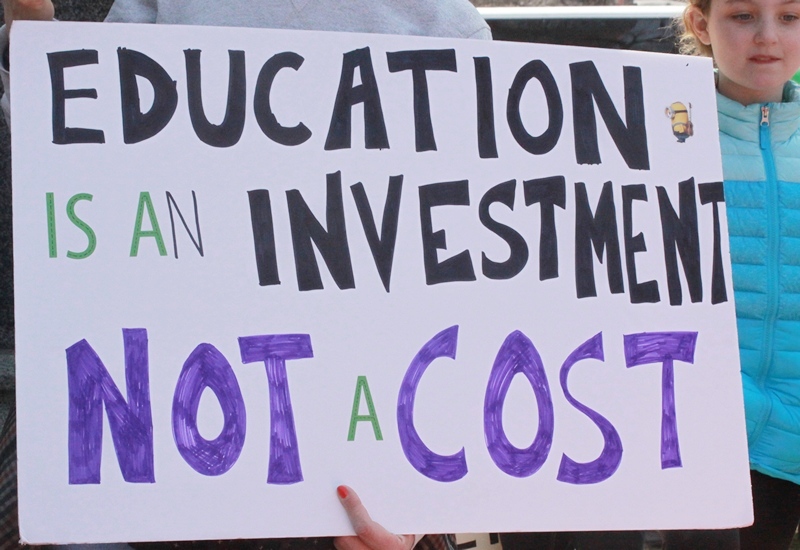In the News April 9
Defending Public Education in Alberta
Oppose Anti-Post-Secondary Education Budget
To no one’s surprise the upper administration of Alberta’s universities, colleges and technical institutes meekly accepted the United Conservative Party (UCP) government’s post-secondary education (PSE) budget, released as part of the province’s overall budget on February 25. This has been the pattern ever since the UCP took power.
Instead of meeting the vicious government cuts with loud calls to increase investments in education and uphold the right to education, the PSE upper administrations simply caved and accepted them.
Of course, one reason the upper administrations so readily bowed to the UCP is that in August 2019, the UCP blitzed Alberta’s post-secondary institutions by inserting numerous UCP representatives onto their boards of governors. Many were energy industry executives. Advanced Education Minister Nicolaides denied, very unconvincingly, that politics influenced the new appointments.
When analyzing what the 2022-23 budget means for the PSE sector, a good starting place is the much-vaunted statistic “cost per student.” One of the UCP’s major whines, based on the report of the phony 2019 MacKinnon Panel, which was set up to reach predetermined UCP conclusions, is that Alberta “spends” more per PSE student than any other province (e.g., $36,500 vs $31,300 for BC).

Now if we could also just lower our spending on energy corporation subsidies, which actually IS out-of-control spending, then things would really be looking up for Albertans because we could invest even more in our students!
Next, the UCP expects to grab an estimated $1.645 billion in tuition revenue from Alberta PSE students in 2022-23. Taking into account as well the UCP tuition revenue for 2019-20 and 2020-21, the forecast for 2021-22, and the projected targets for 2023-24 and 2024-25, this will mean that the UCP will have increased tuition revenue by a total of $389 million during the four years they have been in office, assuming the UCP’s monetary predictions are correct.
The main reason for the huge fee increase is that the UCP lifted the tuition cap implemented by the previous government, which now supposedly limits institutions to increasing tuition by seven per cent every year. But as has been shown by the numerous fee increases recently approved by the UCP for certain University of Alberta (U of A) faculties of up to over 100 per cent, the UCP is quite prepared to give permission for “exceptional increases” far greater than seven per cent. In fact, rumour has it the students want to rename U of A, FleeceU. The tuition limit is a fraud. All U of A had to do to get higher tuition fees was to ask!
In terms of how much the UCP budget predicts will be invested in (“spent on” using UCP-speak) post-secondary operating expenses for 2022-23, the increase over 2021-22 is predicted to be $211 million. That may look good because it’s an increase except it’s $33 million less than the UCP invested in the 2019-20 fiscal year.
According to UCP targets, investments in operating expenses won’t return to the 2019-20 level until after the 2023 provincial election, which of course fails to take into account three years of inflation (4.8 per cent in January) and population growth. And that’s if the UCP gets re-elected.
Another red flag is that overall public funding of PSE is decreasing. For example, between 2019 and 2025, while total PSE funding will increase by $82 million, the public funding portion of that will drop by $351 million. This means that the sinister trend will continue of post-secondary institutions having to increasingly self-fund through tuition fees, commercialization of research, private donations (with strings attached), sale of property, marijuana farms, bottle drives, bake sales, and so on. In 2019-20 PSEs had to dig up 47 per cent of the revenue needed to cover their operating expenses. By 2024-25 that will be 55 per cent and climbing.
And if all the above was not sufficient for the PSE administrations to raise a ruckus, it should also be noted that since being in power, the UCP has eliminated about 1,500 post-secondary workers. This means lost jobs, larger class sizes, fewer programs, fewer lab assistants, less support services, even the closing of libraries.
Further, the PSE sector is interconnected. So, what affects one PSE inevitably ends up affecting all of them.
Albertans need PSEs which vigorously defend the right to post-secondary education, call for increased funding, and oppose those who make excuses for the nefarious schemes of the anti-education UCP.
Workers’ Forum, posted April 9, 2022.

|

|

